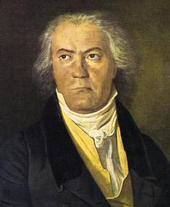This site was created to showcase the piano, chamber, and orchestral works of Ludwig van Beethoven as played by one of the 20th century's great unknown pianists, John Rinehart. Note : James Fittz plays the cello on the Cello and Piano Sonata, Op. 69, and Ronald Pepper plays the violin on the Kreutzer Sonata.
L udwig van Beethoven is revered as the quintessential figurehead of the classical period for which Haydn and Mozart had built the foundation. His passionate and oftentimes fiery works not only stretched the boundaries of previous classical standards but proved timeless in the tracks of generations of musicians to come. The reason for this may be due in large part to the difficult life he lived from beginning to end; these experiences undoubtedly set an emotional charge to everything he would create. Born in Bonn, Germany in 1770, Beethoven lived under the harsh tutelage of an alcoholic father determined to bring fame to his talented son. Johann van Beethoven was successful, but at the expense of young Beethoven's nerves as he had little exposure to anything else in life. Eventually receiving the patronage of Count Ferdinand Waldstein he moved to Vienna, Austria where he quickly gained the reputation as a gifted if not extraordinarily fast pianist. And so popularity paved the way to make himself earnings as a composer (and as performer of his own works) on a regular basis. Throughout this growing period of success Beethoven was plagued with difficulties in his personal life. He was never able to find long-lasting love and therefore a wife suitable to his standards (he was known to harbor a predisposition against women of lower social class). He did gain an heir through his nephew Karl, obtaining custody of him after his father's death, but their relationship proved very rocky and Karl eventually attempted suicide. Worst of all his trials was Beethoven's ever-increasing deafness. As it became worse so did his isolation from the world, further diminishing any positive outlook on life that may have existed before. Yet even after losing all hearing he continued to compose and develop his technique. Among his most famous works are the "Emperor" Piano Concerto No.5, his 3rd, 5th, 6th, 7th and 9th Symphonies, the Kreutzer Sonata for violin and piano, the Archduke Trio, and the Moonlight, Pathetique, Waldstein and Appassionata Sonatas for piano. In 1827 Ludwig van Beethoven succumbed to advanced liver disease, due most likely to his excessive alcoholism over the years. Yet despite his depression and disillusionment with the world it revered him highly in return. It is said that approximately 10,000 people attended his funeral procession in Vienna.
J OHN RINEHART has a MAIN page and SECOND page on the friends list below for anyone interested in knowing more about his life and hearing his compositions as well as other performances. Also visit his BACH MySpace , HAYDN MySpace , MOZART MySpace , CHOPIN MySpace and BRAHMS MySpace pages showcasing 4 performances each and a DEBUSSY MySpace account featuring one performance (En Blanc et Noir).
This site was written/constructed, maintained and monitored by John Rinehart III. All recordings displayed here are the sole property of John Rinehart, copyright 2009.
